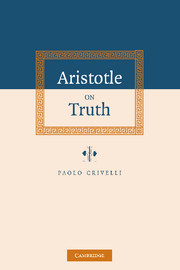Book contents
- Frontmatter
- Contents
- Acknowledgements
- Notes on the text
- List of abbreviations of titles of Aristotle's works
- Introduction
- Part I BEARERS OF TRUTH OR FALSEHOOD
- Chapter 1 States of affairs, thoughts, and sentences
- Chapter 2 Truth conditions for predicative assertions
- Chapter 3 Truth conditions for existential assertions
- Part II ‘EMPTY’ TERMS
- Part III TRUTH AND TIME
- Appendix 1 Metaph. Θ 10, 1051b1: the text
- Appendix 2 Metaph. Θ 10, 1051b2–3: the text
- Appendix 3 Int. 7, 17b16–18: the text
- Appendix 4 The two-place relations in Aristotle's definition of truth
- Appendix 5 Aristotle's theory of truth for predicative assertions: formal presentation
- Appendix 6 The failure of bivalence for future-tense assertions: formal presentation
- References
- Index of names
- Index of subjects
- Index of passages
Chapter 3 - Truth conditions for existential assertions
Published online by Cambridge University Press: 22 September 2009
- Frontmatter
- Contents
- Acknowledgements
- Notes on the text
- List of abbreviations of titles of Aristotle's works
- Introduction
- Part I BEARERS OF TRUTH OR FALSEHOOD
- Chapter 1 States of affairs, thoughts, and sentences
- Chapter 2 Truth conditions for predicative assertions
- Chapter 3 Truth conditions for existential assertions
- Part II ‘EMPTY’ TERMS
- Part III TRUTH AND TIME
- Appendix 1 Metaph. Θ 10, 1051b1: the text
- Appendix 2 Metaph. Θ 10, 1051b2–3: the text
- Appendix 3 Int. 7, 17b16–18: the text
- Appendix 4 The two-place relations in Aristotle's definition of truth
- Appendix 5 Aristotle's theory of truth for predicative assertions: formal presentation
- Appendix 6 The failure of bivalence for future-tense assertions: formal presentation
- References
- Index of names
- Index of subjects
- Index of passages
Summary
In chapter 2 I sketched a theory of the truth conditions for predicative assertions which can be plausibly attributed to Aristotle. The goal of the present chapter is to attain the corresponding result for existential assertions: to outline a theory of the truth conditions for existential assertions which captures Aristotle's views concerning this subject. Aristotle concentrates on existential beliefs and assertions of two types: those concerning simple items, which are essences and incorporeal substances (i.e. God and, perhaps, the intellects that move the heavenly spheres), and those concerning material substances.
The first two sections of the chapter focus on existential beliefs and assertions concerning simple items. The main witnesses are the middle part of Metaphysics Θ 10 and the beginning and the end of de Anima 3.6. Section 1 offers truth conditions for existential beliefs and assertions concerning simple items. Simple items are essences and incorporeal substances, all of which are everlasting, i.e. exist always. It follows that every existential affirmative belief, or assertion, concerning a simple item is always true, and every existential negative belief, or assertion, concerning a simple item is always false. Section 2 addresses a scholarly issue: what does Aristotle have in mind when in Metaphysics Θ 10 he speaks of ‘non-composite substances’? I defend the traditional interpretation, according to which Aristotle has incorporeal substances in mind.
Section 3 addresses the truth conditions for existential beliefs and assertions concerning material substances.
- Type
- Chapter
- Information
- Aristotle on Truth , pp. 99 - 126Publisher: Cambridge University PressPrint publication year: 2004
- 1
- Cited by



